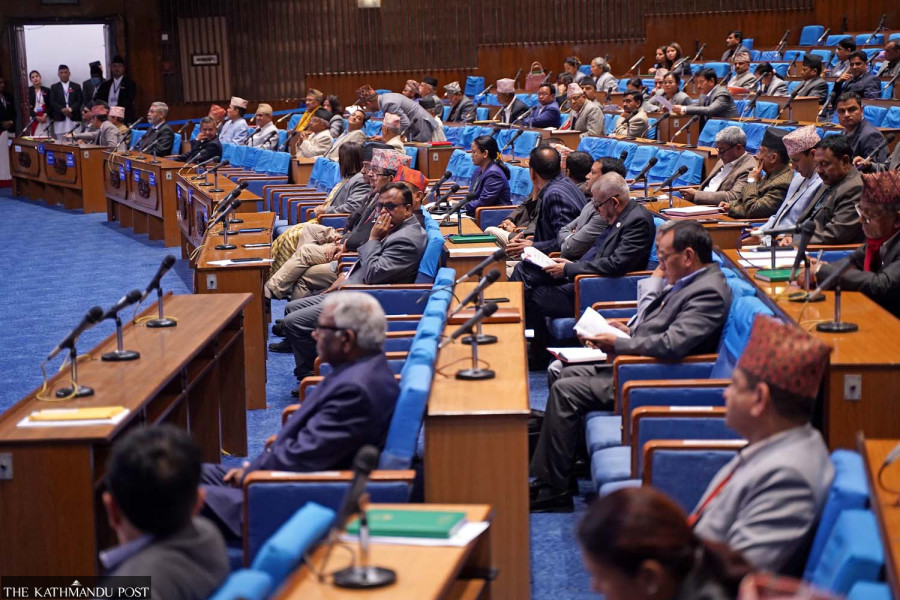Politics
Disputed bill to revise transitional justice law lands in House
Plans to endorse the bill through a fast-track process, but the opposition insists on a detailed discussion.
Binod Ghimire
The government, on Sunday, presented a bill to amend the Enforced Disappearances Enquiry, Truth and Reconciliation Commission Act in the House of Representatives amid objection from the Rastriya Prajatantra Party (RPP) and the Nepal Majdoor Kisan Party (NMKP).
Acting on behalf of Prime Minister Pushpa Kamal Dahal, who is currently heading the law portfolio among others, Minister for Communications and Information Technology Rekha Sharma presented the bill in the House, claiming it doesn’t have provisions for amnesty in cases involving serious violations of human rights.
“It is necessary to amend the Act to conclude the transitional justice process. The bill has categorised human rights violations of varying degrees and those involved in serious violations will be prosecuted,” Sharma said in Parliament. “The peace process hasn’t been completed because the transitional justice process remains incomplete.”

The peace process began around 17 years ago with the signing of a Comprehensive Peace Agreement between the government and the then revolutionary CPN-Maoist. Though two other goals of the agreement—integration of the Maoist combatants in Nepal Army and promulgation of the constitution—have been completed, the transitional justice process—the third goal—remains incomplete. “Concluding the transitional justice process is the government’s top priority. The government is very much committed to ending it at the earliest,” Sharma added.
The RPP and the NMKP were opposed to presenting the bill in Parliament, claiming several of its provisions shield perpetrators. Gyan Bahadur Shahi, an RPP lawmaker who had registered a motion to bar the bill from entering the House, said the bill has provisions that allow amnesty even for murder. “The bill cannot be presented in its current form. It needs to be rejected,” said Shahi. The motion, brought with support from the NMKP, was rejected by a majority.
The government on March 9 registered a new bill in the lower house by incorporating the same controversial provisions as the previous bill, which couldn’t get through the House the last time. A Supreme Court verdict in 2015 struck down around a dozen amnesty provisions in the Act, directing the government to amend it in line with international standards and practices. It asked for the categorisation of violence as serious and non-serious and worthy of amnesty and unworthy of amnesty, depending on their severity.
Successive governments made little effort to amend it, for years. It was only last July that the government registered an amendment bill to the Act, purportedly to address the court’s ruling. However, it had several provisions which the victims and the human rights defenders claimed would deprive justice to the victims. It couldn’t get through Parliament.
Eight months later, the government introduced a similar bill in the House, retaining most of the controversial provisions. Except for allowing for an appeal of the Special Court’s verdict in the apex court and increasing the statute of limitations to file cases from six months to a year, most other provisions remained the same. The bill has listed ‘cruel murder’ or murder after torture, rape, enforced disappearances and inhuman and cruel torture as serious rights violation. But ‘murder’ is just a human rights violation, therefore it qualifies for amnesty, according to the bill.
Talking to the Post, Sharma said the government wants the bill to be endorsed on a fast-track basis so that the transitional justice process can be expedited. “We don’t want to send the bill to the House committee and it should rather be endorsed by the full House without delay,” said Sharma. “However, we will work in coordination with all political parties.”
Bills are generally sent to House committees concerned for detailed discussions.
The opposition parties, however, are against adopting a fast-track for endorsement. The CPN-UML said since several provisions in the bill need to be revised before it gets through the House; it must be sent to the House committee.
“The bill will not ensure justice to victims if it gets endorsed in the present form. We would like to see detailed discussions and consultations with all parties concerned before it gets through the House,” Padam Giri, the UML chief whip, told the Post. “We want the earliest conclusion of the peace process. However, we cannot compromise on human rights principles and justice to the victims.”




 9.68°C Kathmandu
9.68°C Kathmandu















